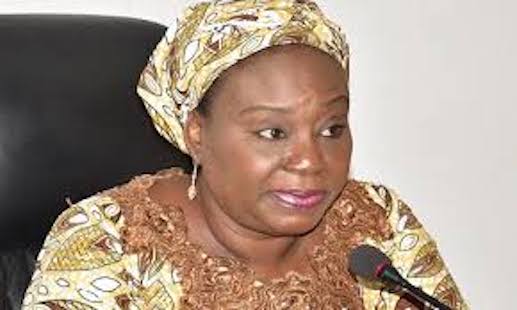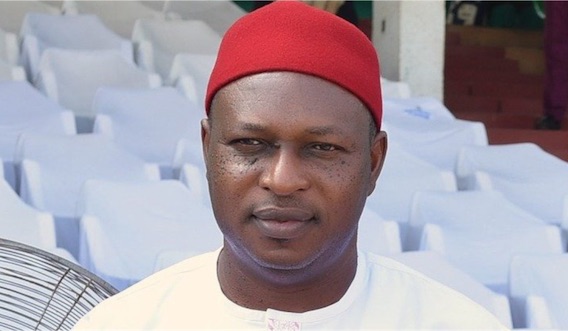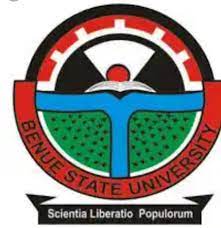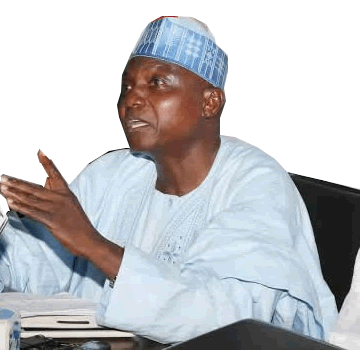Labour
Federal Civil Service Commission and Illegal Recruitment Into The Service

By Tijjani Mohammad
A core mandate of the Civil Service Commission, as an agency of Government, is the recruitment and deployment of officers with requisite qualifications into the civil service.
A major plank on which the commission seeks to realize its vision of building a core of highly focused, disciplined, committed and patriotic civil service is the advertisement of vacancies for the ultimate and equitable recruitment of the best applicants into the service.
This process ensures that recruitment is advertised for equity, competitiveness and that only the best are recruited and deployed accordingly, based on vacancies and needs of MDAs.
However, a counter-productive malady, not consistent with the Commission’s vision, seems to have recently crept into the commission as the nation is witnessing cases of illegal recruitment or employment into the service.
Illegal Recruitment or Employment, broadly speaking, refers to the illegal, unauthorized, and clandestine procurement of fake employment letters, purporting to have emanated from the Commission, to applicants, and subsequent deployments to Ministries, Departments and Agencies, by persons not unauthorized to do so.
It is to be clearly noted that illegal recruitment is different from the criminal sale of advertised vacancies or the ghost worker syndrome.
Whereas the ghost worker syndrome is the insertion of fake names into government payroll by unscrupulous personnel, mostly on the basis of financial gains, illegal recruitment implies the illegal offering of employment letters purported to come from legitimate authorities (thus, conferring employment to one) by people not so authorized.
The criminal sale of genuine and possibly advertised vacancies, by those entrusted with one level of employment or the other, is loosely termed job racketeering.
Regrettably, this debilitating syndrome has so permeated the Ministries, Departments and Agencies that virtually no ministry seems to be insulated from this ugly trend. Indeed, it has become a national challenge.
It is therefore not surprising that speaking with journalists in July, ahead of the 2023 Civil Service Week, the Head of Service of the Federation, Dr. Folashade Yemi-Esan, announced that the Federal government had discovered 1,618 civil servants with fake employment letters.
The Head of Service announced that these civil servants with fake employment letters were detected after the introduction of control mechanisms to address loopholes identified in the Integrated Personnel and Payroll Personnel Information System (IPPIS).
Acknowledging this menace, the Head of Service declared that ‘prior to the introduction of the current mechanisms put in place to drive the implementation of the IPPIS, the system was bedeviled with considerable leakages and wastes as well as the incessant infiltration of ghost workers.’
Unfortunately, whereas the introduction of the IPPIS was meant to curtail and ultimately, eliminate illegalities in the civil / public service, in terms of human resource and payroll, human factor in its application seem to be jeopardizing this noble objective of government.
It is painful that employees of government are capitalizing on insider abuse to undermine the efficiency of the IPPIS and to perpetrate unwholesome activities, resulting in cases of ‘salary paddings’, ghost names in government payrolls, among others that are currently being investigated by government agencies.
Ironically, the issue is not new. For example, as at December 2021, a particular Ministry of the Federal Government alone weeded out a total of 1,020 of such illegally employed staff with over 300 employment letters further sent to be authenticated by the Federal Civil Service Commission. No doubt, many of the later would have turned out to also have been illegally procured!
Usually perpetrated by a syndicate, at a price, the dangers of illegal employment and its cost to the nation can hardly be quantified:
First, while the syndicate may not necessarily exist within the commission, the institutional credibility of the Commission is at stake with its attendant backlash on the quality of the Civil Service.
Also, the quality and capacity of those illegally recruited into the Service cannot be guaranteed with its negative impact on the service since there were no clear cut criteria or standard for such illegal employment.
These recruitments, sometimes, with backdated employment dates, not only bloat the personnel payroll and cost of MDAs, create redundancy and malingering in the service but have become a catalyst for inefficiency, indolence and indiscipline in the service as well as a threat to service delivery.
More worrisome is that sometimes, the syndicate ensures that personnel data of such illegal recruits are promptly captured in the Integrated Personnel Payroll Information System (IPPIS) thereby compromising the Information System and creating a deep drainpipe in the nation’s treasury.
It is on this basis that the Head of Service was reported to have lamented that IPPIS Desk Officers were central to this menace as activities in IPPIS have not been exonerated in this national malaise.
At the moment, a House of Representative Adhoc Committee is investigating alleged employment racketeering and other malpractices in MDAs. Issues relating to IPPIS and its operators have featured prominently in the investigation, to the extent that officers named have been summoned to appear before the committee.
No doubt, the House of Representative’s effort is one, among so many others, meant to address the problem.
The report that a total of 3,657 civil servants have been taken by the Federal Government before the Independent and Corrupt Practices and related offences Commission (ICPC) for prosecution for failing to get verified on the Integrated Personnel Payroll Information System (IPPIS), is heartwarming.
However, it must be stated that towards halting this national malaise, the Civil Service Commission must, as a matter of utmost importance, ensure that this syndicate is dismantled, all money so illegally received by such personnel recovered, while culprits and their accomplices in this national shame are prosecuted.
It is strongly argued that mere removal of such names from payroll without prosecution will not deter those corruptly feasting from this exercise at the expense of a virile civil service backed up by a sound and fool – proof IPPIS.
Noteworthy is that the Independent Corrupt Practices and Other Related Offences Commission (ICPC) had at the 2021 Public Service Integrity Award brought this to the attention of then President Muhammadu Buhari who vowed to punish such erring and corrupt officials. That commitment by the President didn’t seem to have deterred the perpetrators.
Similarly, then Minister of Labour and Employment, Dr. Chris Ngige stated that he had raised alarm to the Federal Executive Council (FEC) on the employment racket in his Ministry, leading to the invitation of the ICPC for further investigation.
Therefore, since this anomaly can be rightly said to be known to the State at the highest level, nothing should hinder its frontal attack and ultimate elimination before it weakens the cohesion of the civil service with its attendant damage to governance and service delivery.
Therefore, the Commission must synergize more with ICPC, Office of the Head of Service of the Federation and other relevant agencies to halt this trend, recover all illegal remunerations and payments already received by such illegal employees, expose all members of the syndicate, their accomplices and collaborators for prosecution under relevant laws.
Until this these steps are taken, it does not seem that the illegal recruitment syndrome in the civil service will come to an end.
Tijjani Mohammad, is with Federal Ministry of Information, Abuja
JUDICIARY
LG Autonomy: Supreme Court Judgment Meets Constitutional Order- Edeoga

Former Governorship Candidate of the Labour Party(LP) for the 2023 elections in Enugu State, Hon Chijioke Edeoga has hailed the Thursday ruling of the Supreme Court, which granted financial autonomy to the nation’s 774 LGAs.
Edeoga, in reaction to the judgment said in a statement in Abuja that the judgment was in line with the existing constitutional order.
“While it is suspected that the judgment may not meet the approval of advocates of political restructuring in Nigeria, there is no doubt that it accords with the demands of the existing constitutional order.
“The violation of the provisions of the Nigerian Constitution of the Federal Republic of Nigeria by governors of Nigerian states has been going on with flagrant impunity for many years and under different administrations since 1999.
“Local Government Areas, recognized in the Nigerian Constitution as the third tier of government and the one closest to the people, have been deprived of the funds needed for grassroots development, thus existing at the mercy of state governors,” he remarked.
He regretted that over the years, state governors have made local government funds their cash cows, receiving and dispensing as they deemed fit, and without regard to the development imperatives of the councils, their employees, and their respective peculiar development challenges.
“This abuse has given rise to situations where local councils are forced to queue on a strange breadline, where governors favour some local governments while sidelining others.
“The offices of the Economic and Financial Crimes Commission (EFCC) and other anti-corruption agencies are stacked with files bursting with evidence of abuse of local council funds by state governors, whose prosecution has been hindered by red tape and other inexplicable reasons” he noted.
The former Governorship candidate recalled that during his campaign for the Governorship of Enugu State, he highlighted the deplorable management of local council funds in Enugu State and vowed that council funds would be sacrosanct if he won the election.
He said as a former local government Chairman, he knew the importance of those funds and the leverage they provide for rural development, employment generation, and economic empowerment.
“My belief is that rather than treat council funds as a source of free money as most state governors see them, I would ensure easy and direct access to it by council chairmen as a means of ensuring that local government councils become complementary to the state government’s development efforts,” he stressed.
He said his intention upon assumption of office was to empower Local councils and noted that the judgment will minimize the tendency of some governors and state officials to favour their local governments of origin while sidelining others.
“I am particularly relieved that the administration of President Bola Tinubu has taken this rare positive step towards restoring the glories of local administration in Nigeria. “Those of us in the Enugu State chapter of the Labour Party see this as a step in the right democratic direction and must single out President Tinubu and the Attorney General of the Federation, Prince Lateef Fagbemi, SAN, for pursuing this judgement with a single-minded determination and patriotic purposefulness.
“While we commend the current administration for the rare courage and vision deployed in pursuit of this case, we must also advise against allowing the judgement to form another layer of entry in our Case Laws. Nigerians are excited by the judgement and are looking forward to the restoration it would bring to bear on rural development across the country, and would be displeased if deliberate political, judicial, and institutional efforts are not made to ensure that implementation.”
“This judgement, it must be emphasised, is a PUBLIC INTEREST MATTER and has reignited hope of a possible grassroots development renaissance among the progressive-minded people that are interested in the development of Nigeria and the wellbeing of everyone” he stated.
COVER
Minimum Wage: Labour Rules Out Strike, Awaits Tinubu’s Nod

By David Torough, Abuja
The Nigeria Labour Congress (NLC) has ruled out strike action earlier scheduled for Tuesday (today) to demand a new national minimum wage.
The NLC President, Joe Ajaero, made this known yesterday during the ongoing International Labour Conference taking place in Geneva, Switzerland.
Ajaero said organised labour cannot embark on strike today because the figures presented by the tripartite committee on minimum wage were with President Bola Tinubu.
He clarified that the submission of N62,000 as proposed by the government and the organized employers’ body with labour proposing N250,000 does not translate to labour accepting N62,000 as the new minimum wage.
“The tripartite committee submitted two figures to the President. Government and employers proposed N62,000 while labour proposed N250,00o. We are waiting for the decision of the President. Our National Executive Council (NEC) will deliberate on the new figure when it is out.
“We cannot declare a strike now because the figures are with the President. We will wait for the President’s decision.
“During the tenure of the immediate past President, the figure that was proposed to him was N27,000 by the tripartite committee but he increased it to N30,000. We are hopeful that this President will do the right thing. The President had noted that the difference between N62,000 and N250,000 is a wide gulf,” he said.
The NLC president also berated state governors under the umbrella body of the Nigerian Governors’ Forum for rejecting the N62,000 minimum wage proposal.
“How can any governor say he cannot pay? They cannot also be calling for the decentralization of the minimum wage.
“Are there wages decentralized? Governors whose states are not contributing a dime to the national purse and who generate pitiable Internally Generated Revenue (IGR) are collecting the same amount as governors whose states are generating billions of dollars into the FAAC.
“They should decentralize their salaries and emoluments first.
“So, where is the governor of Edo state, Godwin Obaseki getting his money from? He is paying N70,000 minimum wage. This is the type of governor that should be emulated and not the lazy ones,” he added.
COVER
Labour Suspends Strike over Minimum Wage for One Week

By David Torough, Abuja
The Organised Labour yesterday suspended its ongoing indefinite strike action for one week over a new national minimum wage and reversal of the recent electricity tariff hike.
A joint National Executive Council (NEC) meeting of both Nigeria Labour Congress (NLC) and Trade Union Congress (TUC) has approved to relax the industrial action for one week with immediate effect.
It was gathered that the development followed a tentative agreement reached between the Federal Government and the Organised Labour on the new national minimum wage on Monday night with a resolution to further engage daily for the next one week at the level of the Tripartite Committee on National Minimum Wage until a final agreement is reached.
The Federal Government had assured the Labour leaders that President Bola Tinubu was committed to paying a new monthly minimum wage above the initial offer of N60,000.
This was disclosed late Monday night at the end of a marathon meeting convened by the Secretary to the Government of the Federation (SGF), George Akume, in furtherance to the negotiation by the Tripartite Committee on National Minimum Wage (NMW) and subsequent withdrawal of the Organised Labour from the negotiation table.
Members of the NLC and TUC earlier on Monday embarked on an indefinite nationwide strike to press home their demands for a new national minimum wage and reversal of the recent electricity tariff hike, a development that paralysed activities in both public and private sectors across the country.
In a statement issued at the end of the meeting endorsed by the Ministers of Information and that of Labour and Employment, Mohammed Idris and Nkiruka Onyejeocha, respectively, on the part of the Federal Government, and NLC and TUC Presidents, Joe Ajaero and Festus Osifo, respectively, on the part of the Organised Labour, the meeting agreed on a four-point resolutions as a pathway to ending the ongoing industrial dispute.
“The President, Commander-in-Chief of the Armed Forces, Federal Republic of Nigeria is committed to a National Minimum Wage that is higher than N60,000;
“Arising from the above, the Tripartite Committee is to meet every day for the next one week with a view to arriving at an agreeable National Minimum Wage;
“Labour in deference to the high esteem of the President, Commander-in-Chief of the Armed Forces, Federal Republic of Nigeria’s commitment in (ii) above undertakes to convene a meeting of its organs immediately to consider this commitment; and
“No worker would be victimised as a result of the industrial action,” the resolutions read.
In a statement issued at the end of the meeting endorsed by the Ministers of Information and that of Labour and Employment, Mohammed Idris and Nkiruka Onyejeocha, respectively, on the part of the Federal Government, and NLC and TUC Presidents, Joe Ajaero and Festus Osifo, respectively, on the part of the Organised Labour, the meeting agreed on a four-point resolutions as a pathway to ending the ongoing industrial dispute.
“The President, Commander-in-Chief of the Armed Forces, Federal Republic of Nigeria is committed to a National Minimum Wage that is higher than N60,000;
“Arising from the above, the Tripartite Committee is to meet every day for the next one week with a view to arriving at an agreeable National Minimum Wage;
“Labour in deference to the high esteem of the President, Commander-in-Chief of the Armed Forces, Federal Republic of Nigeria’s commitment in (ii) above undertakes to convene a meeting of its organs immediately to consider this commitment; and
“No worker would be victimised as a result of the industrial action,” the resolutions read.
Tinubu Gives Finance Minister 48 Hours to Present New Minimum Wage Template
Meanwhile, President Bola Tinubu has directed the Minister of Finance, Wale Edun, to come up with the cost Implications on the new minimum wage within two days.
Minister of Information and National Orientation, Mohammed Idris, made this known while briefing State House Correspondents after a meeting the negotiation team had with the president at Aso Rock, yesterday.
“All parties to the negotiation of the new minimum wage would work together with the organised labour to present a new minimum wage for Nigerians in one week.
“All of us will work together assiduously within the next one week to ensure that we have a new wage for Nigeria that is acceptable, sustainable and also realistic.”
Idris also disclosed that the President had given a marching order that all those who have negotiated on behalf of the Federal government and all those who are representatives of organised private sectors, the sub nationals to come together to have a new wage award that is affordable, sustainable and realistic for Nigerians
The minister said Tinubu was committed to accepting the resolutions of the tripartite committee on the new minimum wage.
“We were all there to look at all issues, and the president has directed the minister of finance to do the numbers and get back to him between today and tomorrow so that we can have figures ready for negotiation with labour. Let me say that the president is determined to go with what the committee has said, and he’s also looking at the welfare of Nigerians.
“The government is not an opponent of labour discussions or wage increases.”
The minister said the president directed that the committee should work together to give Nigerians an “affordable, sustainable, and realistic” minimum wage.
“All of us will work together assiduously within the next one week to ensure that we have a new wage for Nigeria that is acceptable, sustainable, and also realistic,” he said.
Secretary to the Government of the Federation, George Akume, had summoned labour leaders to an emergency meeting after the strike which crippled economic activities on Monday.
At the end of the meeting, it was announced that the Federal Government had offered to pay higher than N60,000 minimum wage.


















